Growing Guava in Pots is the best way to enjoy these tasty fruits in a small space like a balcony or a patio! Here’s all you need to know!
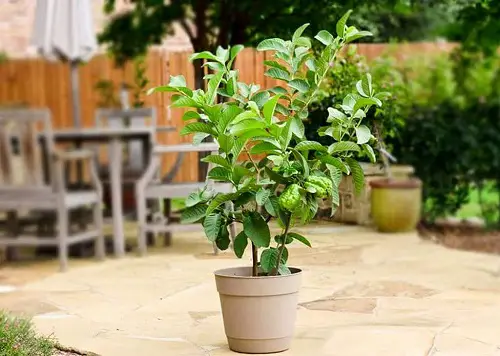
Growing Guava in Pots is not only easy but rewarding too! All you need is a small container and this plant will give you enough harvest for the entire family!
Check out our article on growing blueberries in pots here
Guava Tree Information
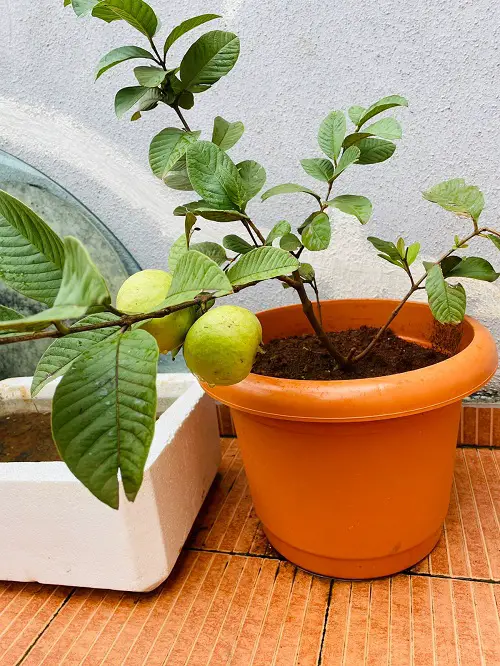
Guava is a small tropical tree that grows 5-6 meters high on average, but if properly pruned it does not exceed the height of 3 meters. This makes it perfect for growing in containers.
Its leaves are born in pairs with a pale green color and leathery texture. Fruit shape, size, the color of flesh and skin usually depends on the variety. Maturity is observed when the shell reaches a yellowish-green, yellow, pink, or pale color.
Other Names: Amrood, Amrut Phala, Araçá-Goiaba, Araçá-Guaçú, Banjiro, Brazilian Guava, Brazilian Red Guava, Common Guava, Fan Shi Liu, Feuille de Goyavier, Goiaba, Goiabeiro, Goyabe, Goyave, Goyave Jaune, Goyave Rouge, Goyavier, Goyavier du Brésil, Guaiaba, Guaiava, Guajava, Guava Leaf, Guava Leaves, Guava Peel, Guava Pulp, Guava Seed, Guava Seed Protein, Guavas, Guave, Guavenbaum, Guayaba, Guayabo, Guayave, Koejawel, Lemon Guava, Pépin de Goyave, Psidium, Psidium guajava, Pulpe de Goyave, Red Guava, Yellow Guava, Bihi
Best Guava Varieties to Grow in Pots
Over 100 varieties of guavas are identified in the world, different from each other by their flavor and appearance.
Guava Ruby Supreme, Lucknow 49, Psidium Guajava Nana (Dwarf Guava), Tikal Guava, Red Malaysian (Also grown for ornamental purposes), Patricia, Indonesian Seedless, Indonesian White, and Safeda are some of the best ones you can grow in pots.
Propagating Guava Tree
From Cuttings
Growing guava from cuttings requires specific temperature and humidity, this method is suitable in warm climates. Just snip away 4-6 inches long cutting and plant it in a well-draining growing medium in bright light.
From Seeds
Guava seeds are propagated easily with high germination rate. The main thing is that they must be fresh and obtained from a quality source. You can also use seed fresh seeds collected from the fruit but it is better to buy seeds from a seed store or online.
Guava tree grown from seeds take 3-4 years to mature and start to form fruits. From cuttings, it grows more quickly. However, our recommendation for you is to buy a grafted guava tree. Most of the grafted trees start to bear fruit in the same year and remain healthy.
Best Pot Size for a Guava Tree
Guava grows large, around 15 to 20 feet, but in pots, it can be reduced to 5 to 8 feet. A standard 12 to 14 inches pot will be good to start a medium-sized plant available in plant nurseries. Then, you can re-pot it within a couple of years, depending more on the growth, into one size bigger container than the previous one.
Eventually, a large 20 to 24 inches pot can easily accommodate a grown-up guava tree.
Requirements for Growing Guava Tree in a Pot
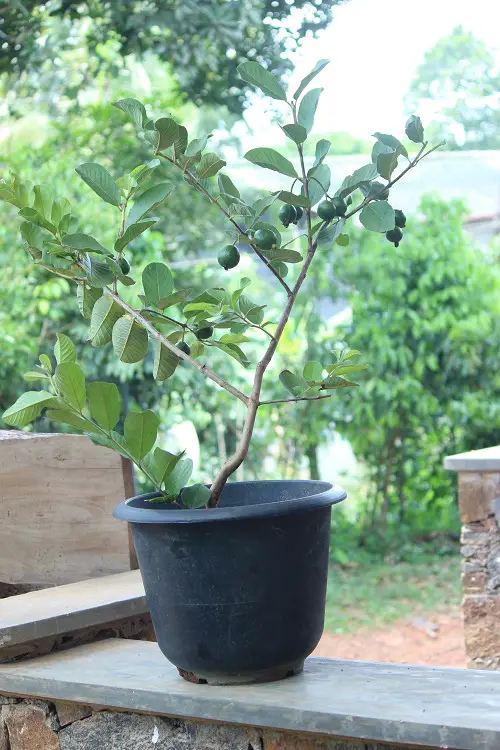
Location
While growing guava in a container, choose a location that gets at least 6-7 hours of direct sunlight daily. The more sun it gets, the better it will be for healthy growth and more fruiting.
Soil
For growing guava in pots, choose a quality potting mix or make your own substrate using equal parts compost, sand, and soil. The pH should be between 5.5 to 7.5. Amend the growing medium with plenty of organic matter such as well-rotted cow manure at the time of starting the plant.
Watering
When the plant is young or forming flowers, water it regularly and deeply to keep the soil slightly moist. It helps in developing more juicy and sweet fruits. Always water when the topsoil feels a little dry to the touch.
Temperature
A mature guava tree (at least 3 years old) can bear temperatures down to 20 F (-6 C). Keep it safe from cold drafts. It would be a good idea to bring the plant indoors if you live in a climate with cold weather conditions in winter.
Guava Tree Care
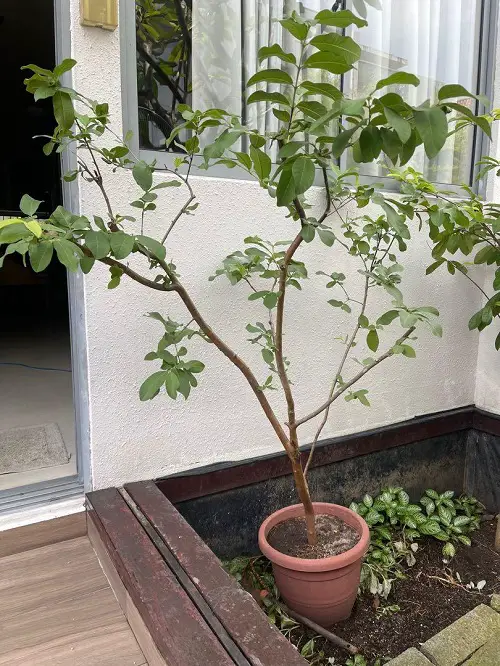
Pruning
Pruning is essential to keep the guava tree in desired shape and size. Dry, dead, damaged, or diseased branches can be pruned anytime.
The best is to cut back long, unbranched shoots and branches that are crossing each other and blocking the penetration of sun rays after the harvest or at the beginning of the growing season.
Fruit Thinning
Allow no more than four fruits per branch. Also, thin out the fruits if they are developing on a small and weak branch.
Fertilizer
Guava responds well to the monthly fertilizing. When the tree is young and is not bearing fruits, fertilize your potted guava tree with 6:6:6:2 [N P K Mg] to speed up the growth of the plant.
When the tree starts to bear fruits change the composition to 8:3:9:2 [N P K Mg].
Mulching
Do mulching with organic matter so that the plant retains moisture. It also helps in insulating the roots in winter.
Pests and Diseases
The guava tree is very tough, but you should keep an eye on common garden pests. Mealybugs, guava scales, white flies, fruit flies, and thrips can affect it.
In diseases, the guava plant suffers from rust, which occurs in too warm weather and high humidity. Besides this, anthracnose and leaf spots can be a problem too.
To avoid these issues, avoid overwatering and keep the plant at a location with proper air circulation.
Harvesting Guavas
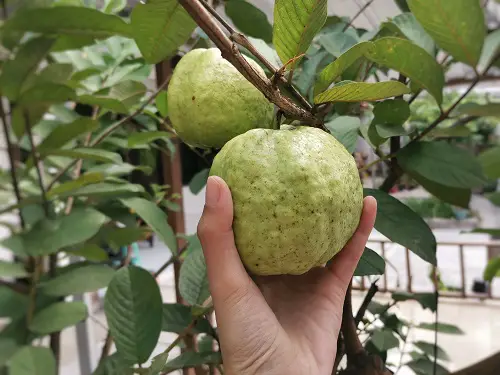
Most of the guava tree varieties are self-pollinating, and the fruit ripens year-round in tropical and arid climates (except in summer). Guava fruits usually mature in 3 to 4 months after flowering.
In India, generally, the main crop arrives in winter and after the summer in the rainy season. The winter crop is more flavorsome and sweet.
Guava Uses
Guava fruits taste better when picked earlier than they are fully mature. Fruits are highly nutritious, rich in vitamin C, and can be eaten raw – the seeds are edible too.
Ripened fruits can be used to make guava ice cream, juice, jam, chutney, sauce, or desserts.



The article is rudimentary and very useful even to a beginner. Similar articles will be helpful to the urban people.
Hi there,
Thank you for the comment. On Balconygardenweb we try to serve our best to those who live in urban and suburban areas.
Informative and very helpful :)
Informative and very useful. I threw some seeds a few months ago in my front yard as I was eating. Never thought seedlings would appear because they were not properly planted. I’m glad they can grow in containers because I don’t have a big front yard. (^_^)
Quality articles or reviews is the main to invite the people to pay a quick visit the site, that’s what this web site is providing.
The article is simple and highly informative. Lot of thanks for the wide range of tips offered by the author. It will definitely serve as a guideline to grow a dwarf guava plant in a pot. It is a definite blessing for city dwellers
I’m an allopathic doctor and son of a farmer, always interested in balcony gardening. Your article is very informative and useful. Thanks a lot.
thank you for posting – how do you prune a guava tree? I m not sure how to take of my tree.
It’s very useful
Thank you, I found this article very interesting. I bought a dwarf Guava two years ago, but put it in a large pot (too big I think) its healthy and has grown, but no sign of fruiting….yet! Will follow your advice.
Please guide me the method of Pruning guava. My 6 month old plant has only one branch. And it is not in good shape
Very informative. planted my guava plant on the grown but snail is eating all the leaves. Can I transplant the tree back to the pot? It’s barely 2 feet tall.. pls advise. Thanks.
very interesting & informative. thanks a lot.
Thank you for posting. I always thought guava was a tropical fruit so it would not thrive in Phoenix.
Will it grow outside in the yard or only in pots?
Will it be ok if it is planted outside? What is the best Kind to grow outside? Lemon guava, white, strawberry or green on the outside pink on the outside?
I live in Wisconsin and in the spring move the potted guava plant outside and in the fall back in.
It has never flowered. How do I get it to flower?
Guava trees planted directly in a yard will have a massive root ball stretching for as much as 4m/12′ in all directions. Getting the roots out of a mature guava tree requires a machine or several very young, strong people working all day. Grow it in a pot. Suggest a 15-gallon fabric pot that breathes. I live where they grow wild (Hana, Maui, Hawaii) and have dug them up.
Please help. How do I get rid of those white flys?
Any suggestion ? I brought the potted guava indoor few months back , The tip of my indoor guava tree are turning black and fall off. Even small leaves fall. Other than that plant looks healthy .
Any remedy ? Thank you,
Sucheta
I grew two guava trees from seed, planted them in a pot and when young, interwove their stems, so they now grow as one strong tree. I have had them now going into my 4th summer(in Michigan, so they winter indoors) and have yet to have any flowering. I fertilize them monthly with liquid kelp, and aerate the soil several times/year and still no flowering. Is there something else I can do to get them to flower. I have three passion vine plants and they thrive on my deck, with many flowers/fruit each summer. I would like to get some guavas as well
Look up the variety you have. Some Guavas self pollinate others require another of the same species to pollinate or more. You may need a few more to produce fruit and also more time in the sun with an 20 gallon pot. Also you intertwined the plants and one may be suffering for nutrients to compete.